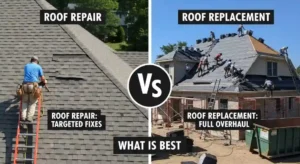Roofing is not just about fixing the linkage, it’s an art to create a safe and long lasting structure to protect your home or business. However it’s important to understand the roofing license requirements before hiring any person. Every state has different criteria for issuing a roofing license to a contractor.
In this blog, we will discuss some of the states and their guides for roofing licenses. Let’s get started!
Do I need a roofing contractor license?
Yes, in most states, you need a roofing license to do any roofing work. Licensing ensures that contractors have up-to-the-mark skills and knowledge to do any roofing task. This also makes them trustworthy and reliable for the clients.
However, in some states, you may not need a roofing license but you have to follow some local requirements according to state law and regulation. The benefit of a roofing license is that you can take on large projects and commercial jobs professionally.
What can I do without a roofing license?
Without a roofing license, you can work in a restricted way. You may just be allowed to perform minor tasks or repairings without a roofing license. Large roofing projects typically require a license. These projects may include;
- Roof installation
- Roof replacement
When you work without a roofing licence you may have to face serious consequences. As a result of these consequences, you may have to pay fines or it may damage your professional reputation.
Therefore, it is recommended that you make sure to get a license to avoid these kinds of risks and meet local requirements to do your job legally.
How long does it take?
The time period to take a roofing license depends on the local requirements of your state but usually, it may take a few months to a couple of years. It may depend on several factors which include,
- Work experience
- Time required to prepare and pass an exam
- Application processing time
Some states have a faster process and just require a few steps to issue a roofing license while others may take a long time due to strict laws and regulations.
How to get a roofing license: state-by-state?
Before getting a roofing licence you have to follow a series of steps. Some of the general steps are given below.
Gain Experience
Firstly you have to gain hands-on experience in roofing. Most states require a specific amount of work experience to verify that you have fundamental knowledge and skills about roofing.
Understand State Requirements
Before getting the licence it’s compulsory to understand state law and regulations. These laws often differ from area to area so you have to know about the place where you plan to work.
Pass the Licensing Exam
Many states conduct a licensing exam to test your skills regarding building codes, safety regulations, and roofing practices.
Meet Additional Criteria
Some states may require background checks, credit checks, or meeting minimum age or education levels. Be sure to complete all prerequisites.
Obtain Insurance and Bonding
Get liability insurance and worker’s compensation coverage, as these are often required for licensing. Being insured and bonded also helps protect your clients and your business.
Apply for Your License
Submit your application along with any required documentation, such as proof of experience, exam results, and insurance details. Pay any applicable fees.
Continuing Education
Once licensed, many states require ongoing education to renew your license and stay up-to-date with changes in the industry.
Roofing Contractor License Guide for Every State
1. Alabama
In Alabama, roofing contractors need a Home Builders License for projects over $10,000. They must pass an exam and carry general liability insurance. If they have employees, workers’ compensation is required. Alabama doesn’t require bonds for roofers, but it’s a good idea to check their license with the Home Builders Licensure Board. Smaller projects might have local rules, so always confirm with your city or county before hiring.
2. Alaska
Roofing contractors in Alaska need a General Contractor’s license, which requires registration with the state. They must carry liability insurance and workers’ compensation if they have employees. While bonds aren’t required, contractors must prove they can handle financial responsibilities. Always verify licenses through Alaska’s online registry. Some cities in Alaska have extra rules, so check local regulations before starting a project.
3. Arizona
Roofing contractors in Arizona must have a C-42 Roofing Contractor License from the state. This involves passing two exams: one for roofing and another for business management. Contractors must also provide proof of insurance and a bond, which varies based on project size. Workers’ compensation is required for those with employees. You can check a contractor’s license through Arizona’s online registry for added peace of mind.
4. Arkansas
In Arkansas, roofing contractors need a Residential or Commercial Builders License for projects over $2,000. They must pass an exam and show financial stability. Liability insurance is required, and workers’ compensation is necessary if they employ workers. Check a contractor’s license with the Arkansas Licensing Board, and don’t forget to confirm any additional local requirements in your area.
5. California
In California, roofers need a C-39 Roofing Contractor License. They must pass
- Exams on law and roofing practices
- Carry liability insurance
- Provide a surety bond
Workers’ compensation is required if they have employees. California has strict consumer protection laws, so always verify a roofer’s license through the state’s online system. Unlicensed work is illegal for projects over $500, so make sure your roofer is licensed.
6. Colorado
Colorado doesn’t have state roofing licenses, but local governments often have rules for registration, permits, or insurance. Liability insurance is usually required, and workers’ compensation is mandatory for contractors with employees. Always check local regulations and verify insurance before hiring a roofer to ensure compliance with city or county rules.
7. Connecticut
In Connecticut, roofers must register as Home Improvement Contractors. They need liability insurance and workers’ compensation if they have employees. The state prioritizes consumer protection, so contracts must follow the Home Improvement Act. Always verify a contractor’s registration and insurance using Connecticut’s database to ensure they’re reliable and meet state standards.
8. Delaware
Roofers in Delaware need a General Contractor license, which requires registering with the Division of Revenue and providing proof of insurance. Workers’ compensation is also mandatory for contractors with employees. It’s important to verify a roofer’s license online. Since some cities and counties have additional rules, check local requirements before hiring.
9. Florida
Florida roofers need a Certified Roofing Contractor License from the state. This requires passing an exam, proving financial responsibility, and carrying liability and workers’ compensation insurance. Licensed contractors can work across the state, but local rules may apply. Always check a roofer’s license through Florida’s state database to ensure they’re qualified.
10. Missouri
In Missouri, roofing contractors do not need a state license to operate. However, some local municipalities may require contractors to register before beginning work on a project.
Additionally, if a contractor employs workers, they must have liability insurance and workers’ compensation insurance. It’s crucial to consult with your local building department to ensure that the contractor complies with any specific regulations in your area. Doing so helps avoid potential issues and ensures you are hiring a qualified professional for your roofing needs.
11. Montana
Montana does not require roofing contractors to hold a state license. However, contractors must have general liability and workers’ compensation insurance if they have employees. As local regulations can vary, it’s important to confirm the contractor’s credentials with your local government to ensure they meet any specific requirements for your area.
Verifying these details before hiring helps ensure that the contractor is properly insured and legally compliant, offering you protection in case of any accidents or issues during the project.
12. Nebraska
Roofing contractors in Nebraska are not required to obtain a state-level license, but certain local jurisdictions may require contractors to be licensed or registered for specific types of projects. If the contractor has employees, they must carry both liability insurance and workers’ compensation insurance.
To avoid hiring an unqualified or uninsured contractor, always check with local authorities to confirm the contractor’s qualifications and ensure they comply with any local regulations. This can help protect you from potential issues and delays during the roofing job.
13. Nevada
In Nevada, roofing contractors are required to hold a valid state contractor’s license issued by the Nevada State Contractors Board. Obtaining this license involves
- Passing a written exam
- Proving financial stability
- Providing proof of liability and workers’ compensation insurance
It is essential to verify the contractor’s credentials by checking their license status with the Nevada State Contractors Board. Hiring a licensed contractor ensures they are properly qualified, which can help avoid complications or legal issues during the roofing project.
14. New Hampshire
Roofing contractors in New Hampshire are not required to obtain a state license for most residential roofing projects. However, contractors must meet local registration requirements and may need a specialty contractor license for specific tasks, such as working with certain materials or structural requirements.
If the contractor employs workers, they must carry liability and workers’ compensation insurance. Always verify the roofer’s credentials with your local authorities to ensure they are following all necessary regulations and are qualified to complete the job correctly and safely.
15. New Jersey
In New Jersey, roofing contractors must register with the Division of Consumer Affairs, but they are not required to have a formal state license. However, contractors must carry general liability insurance and workers’ compensation insurance to protect both the homeowner and workers.
It is important to check the contractor’s registration and insurance coverage before hiring. Ensuring that a contractor is properly registered and insured helps protect your investment and provides peace of mind that the work will be done according to state regulations.
16. New Mexico
Roofing contractors in New Mexico must hold a valid license issued by the New Mexico Regulation and Licensing Department. Contractors are required to pass a licensing exam and meet strict insurance requirements, including liability and workers’ compensation coverage.
Before hiring, verify the contractor’s license status with the state’s licensing board to ensure they are legally qualified. This helps ensure that the contractor is reputable and meets state standards, reducing the risk of issues or legal complications during the roofing project.
17. New York
Roofing contractors in New York are not required to have a state license, but they must follow local regulations. Many cities and counties require contractors to obtain specific permits or register before starting any roofing projects.
Additionally, contractors must carry liability and workers’ compensation insurance if they have employees. Before hiring a roofer, check with your local authorities to ensure the contractor is compliant with any local rules or permit requirements.
18. North Carolina
In North Carolina, roofing contractors must obtain a general contractor’s license if the project is valued at $30,000 or more. This license requires passing an exam and meeting financial stability requirements. While workers’ compensation insurance is mandatory for contractors with employees, other types of insurance are not required.
Before hiring, verify the contractor’s license with the North Carolina Licensing Board for General Contractors. Ensuring that the contractor is properly licensed helps guarantee that they have the necessary skills and qualifications for the job.
19. North Dakota
Roofing contractors in North Dakota must obtain a license for projects valued over $4,000. They are also required to provide a certificate of liability insurance and proof of compliance with Workforce Safety & Insurance (WSI) regulations.
Before hiring a contractor, always check their license with the North Dakota Secretary of State’s office to ensure they meet all state requirements. This protects you by ensuring the contractor is legally certified and properly insured.
20. Ohio
In Ohio, roofing contractors do not need a state license, but they must register with the Secretary of State’s office. Local cities or counties may have their own licensing rules, so check the specific requirements in your area.
While insurance is not required by law, contractors should have general liability insurance to protect against accidents or damage during the project. Always verify the contractor’s registration and consider asking for proof of insurance before hiring them.
21. Oklahoma
Roofing contractors in Oklahoma don’t need a state license, but they must register with the Oklahoma Construction Industries Board. Contractors must also show proof of liability insurance and workers’ compensation coverage.
Residential roofers do not need formal education, but commercial roofers may have additional educational requirements. Before hiring a contractor, confirm their registration and insurance to ensure they meet all necessary legal standards.
22. Oregon
In Oregon, roofing contractors must have a license from the Oregon Construction Contractors Board (CCB). To get this license, contractors must complete a 16-hour pre-license training, pass an exam, and provide proof of liability insurance, workers’ compensation, and a surety bond.
They must also have the correct classification for their work type. Be sure to verify the contractor’s credentials through the Oregon CCB before hiring them for your project.
23. Pennsylvania
Roofing contractors in Pennsylvania do not need a state license, but they must register with the state’s Attorney General’s office. Local areas may have their own licensing rules, so check with your city or town for specific requirements.
Contractors are required to have liability insurance and must follow consumer protection rules when signing contracts. Always verify their registration and insurance before hiring to ensure they are properly qualified.
24. Rhode Island
In Rhode Island, only commercial roofing contractors need a license. To get a license, they must complete a 5-hour course or graduate from an accredited vocational school and carry $500,000 in liability insurance and workers’ compensation coverage. Residential roofers do not need a license. Be sure to verify the contractor’s credentials with the Contractors’ Registration and Licensing Board before hiring them.
25. South Carolina
Roofing contractors in South Carolina must register as Residential Specialty Contractors for roofing work. They need to provide references, a credit report, and proof of a $5,000 bond if their projects exceed that amount.
While the state does not require insurance, contractors are encouraged to have general liability insurance. Always check the contractor’s registration status with the state before hiring them for your roofing project.
26. South Dakota
In South Dakota, roofing contractors do not need a state license, but local jurisdictions may have their own licensing or registration rules. Contractors must have workers’ compensation insurance if they employ workers. Always check with local authorities to confirm that the contractor complies with all local regulations before hiring them for your roofing job.
27. Tennessee
Roofing contractors in Tennessee must have a state license if the project is over $25,000. They need to show experience, pass exams, and provide proof of liability and workers’ compensation insurance.
For projects between $3,000 and $25,000 in certain counties, a Home Improvement license is needed. Always verify the contractor’s license and insurance with the Tennessee Department of Commerce & Insurance before hiring them.
28. Texas
In Texas, roofing contractors don’t need a state license, but local municipalities may have their own licensing rules. Contractors are encouraged to take part in a certification program, which requires passing exams and providing proof of general liability insurance and workers’ compensation coverage. Always check with local authorities to ensure the contractor meets any local licensing or insurance requirements before hiring.
29. Utah
Roofing contractors in Utah must have a specialty contractor’s license from the Division of Occupational and Professional Licensing. To qualify, contractors must complete a 25-hour pre-license course and provide proof of $300,000 in general liability insurance.
Contractors with employees must also have workers’ compensation coverage. Always check the contractor’s license and insurance status with the state before hiring them.
30. Vermont
Roofing contractors in Vermont don’t need a state license. However, if a project is valued at $10,000 or more, contractors must register with the Office of Professional Regulation. Although a license isn’t required, contractors should have liability insurance and workers’ compensation if they employ workers. It’s important to check local regulations to see if any additional requirements apply to your specific area.
31. Virginia
In Virginia, roofing contractors must obtain a license based on the project’s value. Contractors must complete a pre-licensure course and meet experience requirements.
Licenses are categorized into three classes.
- Class C for smaller projects (up to $10,000)
- Class B for medium projects
- Class A for larger projects
While insurance isn’t mandatory, it’s recommended that contractors carry general liability insurance. Be sure to verify the contractor’s credentials with the Virginia Department of Professional and Occupational Regulation (DPOR).
32. Washington
Roofing contractors in Washington must register as Specialty Contractors with the Labor and Industries Department. This registration requires a $6,000 bond and general liability insurance coverage of at least $250,000. No specific education or experience is needed, but it’s crucial to confirm the contractor’s registration and insurance coverage before hiring them for your project.
33. West Virginia
Roofing contractors in West Virginia must apply for a license through the Division of Labor. To obtain the license, contractors must pass both a business and law exam and a trade exam.
They must also provide proof of workers’ compensation, unemployment coverage, and general liability insurance. Be sure to verify the contractor’s credentials with the West Virginia Division of Labor before hiring.
34. Wisconsin
In Wisconsin, roofing contractors must have a “dwelling contractor” license for projects that require a permit. To get this license, contractors must provide proof of financial responsibility, such as a $25,000 bond or $250,000 in general liability insurance.
Contractors must also meet workers’ compensation and unemployment compensation requirements. Always verify the contractor’s credentials with the Department of Safety and Professional Services.
35. Wyoming
In Wyoming, roofing contractors are not required to have a state license. However, local municipalities may have their own licensing or regulation requirements. Contractors should check with local authorities to ensure they follow city or county rules.
Although the state doesn’t mandate insurance, contractors may still need workers’ compensation coverage if they employ workers. Always confirm local regulations before hiring a contractor.
36. Hawaii
Roofing contractors in Hawaii must have a C-42 Roofing Contractor License from the Department of Commerce and Consumer Affairs (DCCA). This license requires contractors to pass an exam, provide proof of liability and workers’ compensation insurance, and meet financial stability requirements. Verify the contractor’s license through the DCCA website to ensure they are properly licensed and insured.
37. Idaho
In Idaho, roofing contractors are not required to hold a state license. However, if they have employees, they must register with the Idaho Contractors Board and carry workers’ compensation insurance. Local jurisdictions may have additional requirements, so always verify the contractor’s compliance with local rules and regulations before hiring.
38. Indiana
Indiana does not require a state license for roofing contractors. However, local municipalities often have their own licensing, registration, and permit requirements. Contractors are encouraged to carry liability insurance and workers’ compensation insurance if they have employees. Always verify local requirements to ensure the contractor is qualified and insured.
39. Iowa
Roofing contractors in Iowa must register with the Iowa Division of Labor. Registration requires proof of workers’ compensation insurance for contractors with employees. While no state license is required, local jurisdictions may have additional requirements. Always check with local authorities and verify the contractor’s registration before hiring.
40. Kansas
Kansas does not have statewide licensing requirements for roofing contractors. However, contractors must comply with local regulations, which may include licensing, permits, or insurance requirements. Contractors should carry liability and workers’ compensation insurance to protect clients and employees. Check with your local government for specific requirements.
41. Kentucky
In Kentucky, roofing contractors do not need a state license, but local municipalities may have their own licensing and registration requirements. Contractors should carry liability insurance and workers’ compensation insurance if they have employees. Always check local regulations and verify the contractor’s credentials to ensure compliance.
42. Louisiana
Roofing contractors in Louisiana need a Residential Contractor’s License for projects over $7,500. This requires passing an exam, providing proof of liability insurance, and meeting financial stability requirements. Workers’ compensation insurance is also required for contractors with employees. Verify licenses through the Louisiana State Licensing Board for Contractors before hiring.
43. Maine
Maine does not require roofing contractors to have a state license. However, contractors should carry liability insurance and workers’ compensation insurance if they employ workers. Some local jurisdictions may have additional licensing or permit requirements, so it’s important to check local regulations before hiring.
44. Maryland
Roofing contractors in Maryland must have a Home Improvement License from the Maryland Home Improvement Commission (MHIC). This involves passing a licensing exam, proving financial stability, and carrying liability and workers’ compensation insurance. Verify licenses through the MHIC website to ensure the contractor is properly qualified.
45. Massachusetts
Roofing contractors in Massachusetts must register as Home Improvement Contractors with the Office of Consumer Affairs and Business Regulation. Registration requires proof of liability insurance and workers’ compensation insurance if the contractor has employees. Contractors must also comply with local regulations, so check local requirements before hiring.
46. Michigan
In Michigan, roofing contractors must obtain a Residential Builders License or a Maintenance & Alteration Contractor License. This involves passing an exam, meeting educational requirements, and providing proof of liability and workers’ compensation insurance. Verify licenses through the Michigan Department of Licensing and Regulatory Affairs (LARA).
47. Minnesota
Minnesota requires roofing contractors to hold a Residential Building Contractor or Residential Remodeler License from the Department of Labor and Industry. This includes passing an exam, providing proof of liability insurance, and maintaining workers’ compensation coverage. Check the contractor’s license through the state’s database to ensure compliance.
48. Mississippi
Roofing contractors in Mississippi need a Residential Roofing Contractor License for projects over $10,000. Contractors must pass an exam, show proof of liability insurance, and meet workers’ compensation requirements if they have employees. Verify licenses through the Mississippi State Board of Contractors before hiring.
49. Illinois
To obtain a contractor’s license in Illinois, you must register with the Illinois Department of Financial and Professional Regulation.
For those pursuing a roofing contractor license, start by filling out the application form, providing the required documents, and paying the applicable fee. Then, pass the licensing exam. Finally, ensure compliance by submitting proof of liability insurance.
50. Vermont
Roofing contractors in Vermont don’t need a state license for most projects. However, contractors must register with the Office of Professional Regulation if the project exceeds $10,000. Liability insurance and workers’ compensation insurance are recommended but not mandatory. Check with local authorities to ensure the contractor meets any specific requirements for your area.
Is it Legal to Work With a License from a Different State?
In most states it’s not legal for a contractor to work in one stature with the license of another state. You can do this only if the state allows it to accept the license of any other state. Every state has different laws and regulations so that’s why it’s not permissible in most of the cases.
Some states have the flexibility to work with another state license if you follow the criteria such as,
- Reciprocity Agreements: Some states have reciprocity agreements, allowing contractors licensed in one state to obtain a license more easily in another state.
- Local Permits and Registrations: While a state license may not be required, local jurisdictions may have their own rules. A contractor may need to register or obtain a local permit to work, even if they hold a valid license from another state.






